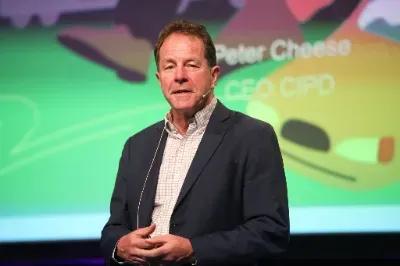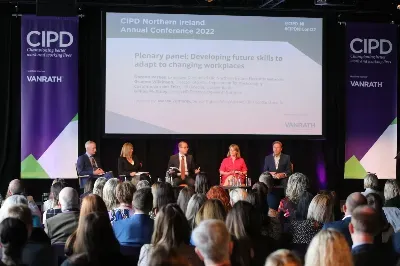Check out the roundup of The CIPD Northern Ireland Annual Conference 2022, some of the key insights from the opening keynote, where CIPD Chief Executive Peter Cheese discussed the trends impacting the world of work, and how we need to use the lessons learned in the pandemic positively as a stimulus for change to shape a fairer, more human world of work.
As Peter said "There has never been a more important time for our profession. We can help to create a better future by championing better work and working lives. What better purpose could we have than that?"
Peter's insights included:
Key areas of focus for the profession must include managing internal change; digital and technological transformation; changing demographics; diversifying employment relationships; sustainability, purpose, and responsible business.
It's crucial to put people right at the centre of business - employee voice, empowerment, recognition, inclusion, wellbeing, compassion, and purpose are all so important.
Although pay and benefits are still the top drivers of employment and retention, job security, flexible and hybrid working, career development, and organisational culture all play an important part in recruiting and retaining the best people.
The pandemic has really intensified concerns about mental health. We need to open up conversations about mental health and wellbeing - and it has to start at the top.
People professionals have a key role in training, coaching, enabling, and facilitating line managers to enable them to manage their people effectively.
We need to learn to make better use of evidence to build our function and the profession.
As people professionals we need to invest in ourselves more to build our professional capabilities - and also take time to learn from others.
The CIPD NI Conference included a plenary panel session on skills, hosted by CIPD’s Senior Public Policy Adviser Marek Zemanik. The discussion was wide-ranging, reflecting the diversity of the organisations represented on the panel, and provided an excellent overview of some of the current and future challenges in the skills space as well as some policy and practitioner suggestions.
While skills needs differ across organisations it's is in all of our interests to minimise skills mismatches and ensure that we are ready for the large economic transitions coming our way.
Graeme Wilkinson Director of Skills at the Department for the Economy NI outlined the recent developments around the new Skills Strategy, including the new Skills Council, and emphasised the importance of the employer voice to be heard on a public policy level. He highlighted that there has been a 25% reduction in investment in skills in NI, and said that reversing this, and investing in STEM qualifications are priorities for the government.
Caroline van der Feltz from Danske Bank UK said that there is a social responsibility as well as a commercial one for helping young people to develop their skills and improve their employability. She spoke about the importance of digital skills and highlighted how competitors in the financial services industry have been working together to support skills development for mutual benefit.
Gillian McAuley, Group HR Director at Devenish highlighted how close cooperation with universities and other education and training providers can help organisations with their talent pipeline. She explained the benefits that Devenish derived from calling their programme an early talent programme instead of a graduate programme, thereby attracting young talent from diverse backgrounds.
Gordon Parkes (Chartered Companion CIPD) MBA, Executive Director, HR at Northern Ireland Electricity Networks (NIE Networks) emphasised the importance of engaging and developing programmes for those with low or no qualifications if we want to address Northern Ireland’s future skills and labour needs. He said that jobs shouldn't have boundaries, and if you want to keep people they need to be able to move around the business.
The next session included Veronica Hope Hailey from the Forward Institute and Northern Ireland Civil Service Strategic Director of HR, Jill Minne who shared lots of fascinating insights around leadership and trust in the new world of work in conversation with Peter Cheese.
Interesting to note that in the first year of the pandemic, Veronica's research showed that leaders were highly trusted because they made themselves much more accessible and open to listening than ever before; communication became a two-way dialogue - something that we mustn't lose sight of in the new world of work.
Some key insights:
Jill stressed that collective leadership across the Civil Service will be key to leading change in NICS. People professionals are playing an important role in HR innovation, including opening up recruitment and changing L&D practices.
Veronica praised the 'pop up leaders' who weren't necessarily on the talent map at the beginning of Covid, but who were able to adapt and lead through uncertain times.
An increase in hybrid working could be introducing a whole new set of cultural issues and challenges for organisations. Jill says that frontline workers are fed up with conversations about hybrid working, and figuring out how to avoid creating a two-tier workforce is a huge challenge for people professionals.
Veronica says that managers need to learn to manage and lead differently. "Motivating, engaging and empowering people working in a virtual environment is very different."
Jill urged organisations to trust their managers more - they need to be able to decide what works best for their staff.
Veronica quoted one business leader who said "We will be judged more on what happens between 2022 and 2025 than we were during the pandemic, and we're anticipating a summer of discontent." Challenging times ahead.
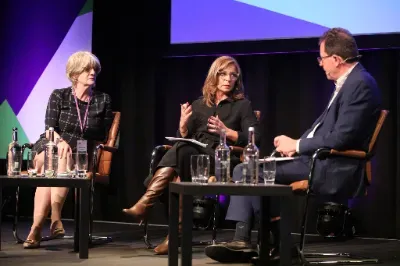
“The talent puzzle' was the biggest breakout session at the conference, told us that the UK labour market is tighter than ever, candidates for jobs are in short supply, and demand for staff continues at pace. So it's not surprising that with so many organisations struggling to attract and retain talent.
Delegates heard Barbara McKiernan, Managing Director of VANRATH and Deborah Stevenson People and Operations Director at PwC discussing why the current recruitment market is a candidate market, and what organisations can do to attract the best talent.
What's clear is that while salary is important, and in many cases compensation expectations have changed, candidates are looking for other benefits beyond reward, and for many people, a renewed sense of purpose following the pandemic is leading them to re-think what they might want from their future careers.
Some of our key takeaways:
Barbara shared the latest data from People Management which showed that 77% of organisations have had problems finding and keeping employees. She said that organisations need a diversified recruitment strategy, which includes targeting passive candidates.
Deborah said that PwC have had to turn on every recruitment channel over the past year, going far beyond graduate recruits to target mid-career and more experienced professionals. She advised to recruit for potential - and focus on your silver and bronze medal employees, and not just your superstars.
Barbara says that organisations have to be agile and innovative. Culture is key, and listening and communicating are key to retaining talent.
Recruiters are competing on a much bigger scale according to Deborah. Remote working means that local talent is often being recruited into global roles.
Barbara recommends sharing stories, photos and videos on social media to bring your organisation to life and showcase it as a great place to work.
Deborah said that increasingly employees are making choices whether to join or remain with an employer based on their corporate values and what they're doing to make a difference. Belonging and a sense of community are critical - all more challenging in the hybrid world of work.
Barbara said that we all need to be open to improvement. Exit interviews can be a great source of feedback for what needs to change.
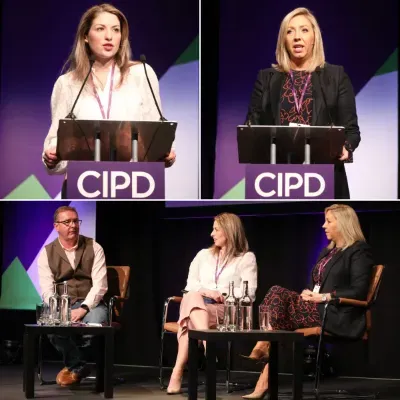
The importance of inclusion and diversity was a key thread that ran throughout the conference.
It was explored in depth in a panel discussion on inclusion, chaired by Emer Hinphey co-founder of Think People Consulting Ltd, where a first-class panel shared their insights into creating inclusive workplaces.
The clear messages from the session were that inclusion and diversity are really good for business, the commitment to I&D has to start at the top, and people professionals have a key role to play in forwarding inclusion in their organisations.
David Johnston (Chartered FCIPD) highlighted that remote working hasn't benefitted everyone through the pandemic. As he said "We were all in the same storm, but very much in different boats." This was also highlighted by Diversity Mark interim head Nuala Murphy who said that for many people, remote working has been really bad for inclusion.
Jane McDonald Chartered MCIPD FIEDP from Babcock International Group said that many leaders are scared that they will get things wrong in terms of diversity, and people professionals need to support them in their role.
Nuala urged delegates to recognise where their organisations are, and work with the resources that they have to improve diversity. The Diversity Mark accreditation can help. On an individual level, she also asked delegates to check their own biases.
David Johnson said that organisations need to create safe spaces to have conversations about what might otherwise be considered to be unsafe conversations.
Jane McDonald said that people professionals should trust themselves, and "show you're human and admit when you don't know what's the right thing to do."
A final important point from David Johnson who says that we all need to think about whether we really need people to put on their cameras during video meetings. "Not everyone wants to share their home environment."
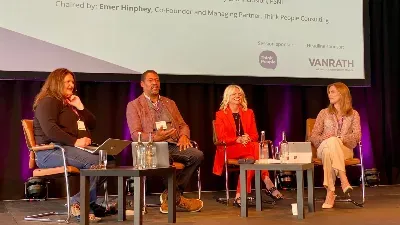
PrOPEL Hub spoke at a breakout session on job quality and people management.
The PrOPEL Hub brings together academics and the CIPD to explore ways to boost productivity and wellbeing through good people management.
The session provided an insight into what research tells us about job quality in Northern Ireland and connect it with practice, looking at job quality through a pandemic lens, discussing what has changed, what has not and what it means for the future.
Marek Zemanik, CIPD’s Senior Public Policy Adviser, outlined the key findings of Working Lives Northern Ireland – the CIPD’s flagship job quality report. He highlighted persistent gaps around workloads, flexible working availability and work-life balance – the latter of which seems to be a particular issue for hybrid workers.
Martin McCracken, Research Director, Ulster University Business School provided interesting insights into some of the PrOPEL research, from the unique experiences of microbusinesses, through a focus on wellbeing at work, to the importance of conflict management.
Will Young FCIPD, Assistant Chief Officer for People and OD, Police Service of Northern Ireland shared a practitioner’s perspective on job quality and some of the challenges
he had to navigate throughout the pandemic and beyond. Will emphasised the need to focus on the human part of people practice, especially when navigating the dangers of a two-tier workforce of those who can work from home and those who can’t. This was a recurring theme throughout the conference, and something that people professionals will increasingly have to grapple with over the coming months.
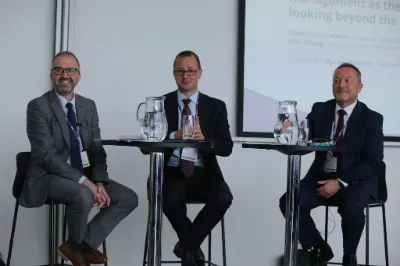
We hope that you have learned a lot throughout the conference and enjoyed reading the key takeaways posted by CIPD NI.
Barbara McKiernan, Managing Director of VANRATH has said “We were delighted to be the headline sponsor at the CIPD NI Conference for the fourth consecutive year. It was great to see so many familiar faces after such a long time as well as new ones.
The event hosted an incredible lineup of speakers that allowed us to hear how we can combat very topical issues at the moment, including attraction and retention of talent. We are very much looking forward to being a part of the conference in 2023.”

